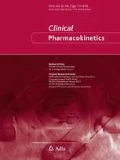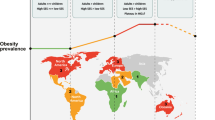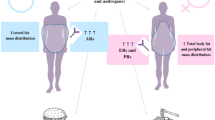Abstract
The prevalence of obesity has dramatically increased in recent years and now includes a significant proportion of the world’s children, adolescents and adults. Obesity is linked to a number of co-morbidities, the most prominent being type 2 diabetes mellitus. While many agents are available to treat these conditions, the current knowledge regarding their disposition in the obese remains limited.
Over the years, both direct and indirect methodologies have been utilized to assess body composition. Commonly used direct measures include underwater weighing, skinfold measurement, bioelectrical impedance analysis and dual-energy x-ray absorptiometry. Unfortunately, these methods are not readily available to the majority of clinicians. As a result, a number of indirect measures to assess body composition have been developed. Indirect measures rely on patient attributes such as height, bodyweight and sex. These size metrics are often utilized clinically and include body mass index (BMI), body surface area (BSA), ideal bodyweight (IBW), percent IBW, adjusted bodyweight, lean bodyweight (LBW) and predicted normal weight (PNWT).
An understanding of how the volume of distribution (Vd) of a drug changes in the obese is critical, as this parameter determines loading-dose selection. The Vd of a drug is dependent upon its physiochemical properties, the degree of plasma protein binding and tissue blood flow. Obesity does not appear to have an impact on drug binding to albumin; however, data regarding α1-acid glycoprotein binding have been contradictory. A reduction in tissue blood flow and alterations in cardiac structure and function have been noted in obese individuals. At the present time, a universal size descriptor to describe the Vd of all drugs in obese and lean individuals does not exist.
Drug clearance (CL) is the primary determinant to consider when designing a maintenance dose regimen. CL is largely controlled by hepatic and renal physiology. In the obese, increases in cytochrome P450 2E1 activity and phase II conjugation activity have been observed. The effects of obesity on renal tubular secretion, tubular reabsorption, and glomerular filtration have not been fully elucidated. As with the Vd, a single, well validated size metric to characterize drug CL in the obese does not currently exist. Therefore, clinicians should apply a weight-normalized maintenance dose, using a size descriptor that corrects for differences in absolute CL between obese and non-obese individuals.
The elimination half-life (t½) of a drug depends on both the Vd and CL. Since the Vd and CL are biologically independent entities, changes in the t½ of a drug in obese individuals can reflect changes in the Vd, the CL, or both.
This review also examines recent publications that investigated the disposition of several classes of drugs in the obese — antibacterials, anticoagulants, antidiabetics, anticancer agents and neuromuscular blockers.
In conclusion, pharmacokinetic data in obese patients do not exist for the majority of drugs. In situations where such information is available, clinicians should design treatment regimens that account for any significant differences in the CL and Vd in the obese.








Similar content being viewed by others
References
Kelly T, Yang W, Chen CS, et al. Global burden of obesity in 2005 and projections to 2030. Int J Obes 2008; 32: 1431–37
Yach D, Stuckler D, Brownell KD. Epidemiologic and economic consequences of the global epidemics of obesity and diabetes. Nat Med 2006; 12: 62–6
World Health Organization. Obesity and overweight [fact sheet no. 311; online]. Available from URL: http://www.who.int/mediacentre/factsheets/fs311/en/index.html [Accessed 2009 Sep 29]
Lobstein T, Baur L, Uauy R. Obesity in children and young people: a crisis in public health. Obes Rev 2004; 5 Suppl. 1: 4–85
World Health Organization. Information sheet on obesity and overweight [online]. Available from URL: http://www.who.int/dietphysicalactivity/publications/facts/obesity/en/ [Accessed 2009 Sep 29]
Haslam DW, James WP. Obesity. Lancet 2005; 366: 1197–209
Hossain P, Kawar B, El Nahas M. Obesity and diabetes in the developing world: a growing challenge. N Engl J Med 2007; 356: 213–5
Abernethy DR, Greenblatt DJ. Drug disposition in obese humans: an update. Clin Pharmacokinet 1986; 11: 199–213
Blouin RA, Warren GW. Pharmacokinetic considerations in obesity. J Pharm Sci 1999; 88: 1–7
Cheymol G. Effects of obesity on pharmacokinetics implications for drug therapy. Clin Pharmacokinet 2000; 39: 215–31
Abernethy DR, Greenblatt DJ. Pharmacokinetics of drugs in obesity. Clin Pharmacokinet 1982; 7: 108–24
Cheymol G. Clinical pharmacokinetics of drugs in obesity: an update. Clin Pharmacokinet 1993; 25: 103–14
Bearden DT, Rodvold KA. Dosage adjustments for antibacterials in obese patients: applying clinical pharmacokinetics. Clin Pharmacokinet 2000; 38: 415–26
Green B, Duffull SB. What is the best size descriptor to use for pharmacokinetic studies in the obese? Br J Clin Pharmacol 2004; 58: 119–33
Ellis KJ. Human body composition: in vivo methods. Physiol Rev 2000; 80: 649–80
Fields DA, Goran MI, McCrory MA. Body-composition assessment via airdisplacement plethysmography in adults and children: a review. Am J Clin Nutr 2002; 75: 453–67
Gray DS, Bray GA, Bauer M, et al. Skinfold thickness measurements in obese subjects. Am J Clin Nutr 1990; 51: 571–7
Kyle UG, Bosaeus I, De Lorenzo AD, et al. Bioelectrical impedance analysis: part I. Review of principles and methods. Clin Nutr 2004; 23: 1226–43
Sutcliffe JF. A review of in vivo experimental methods to determine the composition of the human body. Phys Med Biol 1996; 41: 791–833
Pietrobelli A, Formica C, Wang Z, et al. Dual-energy x-ray absorptiometry body composition model: review of physical concepts. Am J Physiol 1996; 271: E941–51
World Health Organization. Obesity: preventing and managing the global epidemic. Report of a WHO Consultation [WHO technical report no. 894; online]. Available from URL: http://whqlibdoc.who.int/trs/WHO_TRS_894.pdf [Accessed 2009 Sep 29]
Du Bois D, Du Bois EF. Clinical calorimetry: tenth paper. A formula to estimate the approximate surface area if height and weight be known. Arch Intern Med 1916; 17: 863
Mosteller RD. Simplified calculation of body-surface area. N Engl J Med 1987; 317: 1098
Field KM, Kosmider S, Jefford M, et al. Chemotherapy dosing strategies in the obese, elderly, and thin patient: results of a nationwide survey. J Oncol Pract 2008; 4: 108–13
Devine BJ. Gentamicin therapy. Drug Intell Clin Pharm 1974; 8: 650–5
Janmahasatian S, Duffull SB, Ash S, et al. Quantification of lean body weight. Clin Pharmacokinet 2005; 44: 1051–65
Green B, Duffull SB. Caution when lean body weight is used as a size descriptor for obese subjects. Clin Pharmacol Ther 2002; 72: 743–4
Han PY, Duffull SB, Kirkpatrick CM, et al. Dosing in obesity: a simple solution to a big problem. Clin Pharmacol Ther 2007; 82: 505–8
Duffull SB, Dooley MJ, Green B, et al. A standard weight descriptor for dose adjustment in the obese patient. Clin Pharmacokinet 2004; 43: 1167–78
Rivlin RS. Keeping the young-elderly healthy: is it too late to improve our health through nutrition? Am J Clin Nutr 2007; 86: 1572–6S
Han PY, Duffull SB, Kirkpatrick CMJ, et al. Response to “influence of lean body weight on anticancer drug clearance” [letter]. Clin Pharmacol Ther 2009; 85: 24
Niazi S. Volume of distribution as a function of time. J Pharm Sci 1976; 65: 452–4
Greenblatt DJ, Abernethy DR, Divoll M. Is volume of distribution at steady state a meaningful kinetic variable. J Clin Pharmacol 1983; 23: 391–400
Hollenstein UM, Brunner M, Schmid R, et al. Soft tissue concentrations of ciprofloxacin in obese and lean subjects following weight adjusted dosing. Int J Obes Relat Metab Disord 2001; 25: 354–8
Jansson PA, Larsson A, Lönnroth PN. Relationship between blood pressure, metabolic variables, and blood flow in obese subjects with or without noninsulin-dependent diabetes mellitus. Eur J Clin Invest 1998; 28: 813–8
Summers LK, Samra JS, Humphreys SM, et al. Subcutaneous abdominal adipose tissue blood flow: variation within and between subjects and relationship to obesity. Clin Sci 1996; 91: 679–83
Abel ED, Litwin SE, Sweeney G. Cardiac remodeling in obesity. Physiol Rev 2008; 88: 389–419
Abernethy DR, Greenblatt DJ, Divoll M, et al. The influence of obesity on the pharmacokinetics of oral alprazolam and triazolam. Clin Pharmacokinet 1984; 9: 177–83
Abernethy DR, Greenblatt DJ. Phenytoin disposition in obesity: determination of loading dose. Arch Neurol 1985; 42: 468–71
Benedek IH, Fiske III WD, Griffen WO. Serum alpha 1-acid glycoprotein and the binding of drugs in obesity. Br J Clin Pharmacol 1983; 16: 751–4
Benedek IH, Blouin RA, McNamara PJ. Serum protein binding and the role of increased alpha 1-acid glycoprotein in moderately obese male subjects. Br J Clin Pharmacol 1984; 18: 941–6
Cheymol G. Comparative pharmacokinetics of intravenous propranolol in obese and normal volunteers. J Clin Pharmacol 1987; 27: 874–9
Derry CL, Kroboth PD, Pittenger AL, et al. Pharmacokinetics and pharmacodynamics of triazolam after two intermittent doses in obese and normal weight men. J Clin Psychopharmacol 1995; 15: 197–205
Saadeh S. Nonalcoholic fatty liver disease and obesity. Nutr Clin Pract 2007; 22: 1–10
Ijaz S, Yang W, Winslet MC, et al. Impairment of hepatic microcirculation in fatty liver. Microcirculation 2003; 10: 447–56
O’shea D, Davis SN, Kim RB, et al. Effect of fasting and obesity in humans on the 6-hydroxylation of chlorzoxazone: a putative probe of CYP2E1 activity. Clin Pharmacol Ther 1994; 56: 359–67
Emery MG, Fisher JM, Chien JY, et al. CYP2E1 activity before and after weight loss in morbidly obese subjects with nonalcoholic fatty liver disease. Hepatology 2003; 38: 428–35
Abernethy DR, Greenblatt DJ, Divoll M, et al. Enhanced glucoronide conjugation of drugs in obesity: studies of lorazepam, oxazepam, and acetaminophen. J Lab Clin Med 1983; 101: 873–80
Abernethy DR, Divoll M, Greenblatt DJ, et al. Obesity, sex, and acetaminophen disposition. Clin Pharmacol Ther 1982; 31: 783–90
Pai MP, Norenberg JP, Anderson T, et al. Influence of morbid obesity on the single-dose pharmacokinetics of daptomycin. Antimicrob Agents Chemother 2007; 51: 2741–7
Mathijssen RH, Sparreboom A. Influence of lean body weight on anticancer drug clearance. Clin Pharmacol Ther 2009; 85: 23–4
Abernethy DR, Greenblatt DJ, Divoll M, et al. Prolonged accumulation of diazepam in obesity. J Clin Pharmacol 1983; 23: 369–76
Abernethy DR, Greenblatt DJ, Divoll M, et al. Prolongation of drug half-life due to obesity: studies of desmethyldiazepam (clorazepate). J Pharm Sci 1982; 71: 942–4
Dvorchik BH, Damphousse D. The pharmacokinetics of daptomycin in moderately obese, morbidly obese, and matched nonobese subjects. J Clin Pharmacol 2005; 45: 48–56
Benvenuto M, Benziger DP, Yankelev S, et al. Pharmacokinetics and tolerability of daptomycin at doses up to 12 milligrams per kilogram of body weight once daily in healthy volunteers. Antimicrob Agents Chemother 2006; 50: 3245–9
Dandekar PK, Tessier PR, Williams P, et al. Pharmacodynamic profile of daptomycin against Enterococcus species and methicillin-resistant Staphylococcus aureus in a murine thigh infection model. J Antimicrob Chemother 2003; 52: 405–11
Louie A, Kaw P, Liu W, et al. Pharmacodynamics of daptomycin in a murine thigh model of Staphylococcus aureus infection. Antimicrob Agents Chemother 2001; 45: 845–51
Safdar N, Andes D, Craig WA. In vivo pharmacodynamic activity of daptomycin. Antimicrob Agents Chemother 2004; 48: 63–8
Chen M, Nafziger AN, Drusano GL, et al. Comparative pharmacokinetics and pharmacodynamic target attainment of ertapenem in normal weight, obese, and extremely obese adults. Antimicrob Agents Chemother 2006; 50: 1222–7
Allard S, Kinzig M, Boivin G, et al. Intravenous ciprofloxacin disposition in obesity. Clin Pharmacol Ther 1993; 54: 368–73
Newman D, Scheetz MH, Adeyemi OA, et al. Serum piperacillin/tazobactam pharmacokinetics in a morbidly obese individual. Ann Pharmacother 2007; 41: 1734–39
Stein GE, Schooley SL, Peloquin CA, et al. Pharmacokinetics and pharmacodynamics of linezolid in obese patients with cellulitis. Ann Pharmacother 2005; 39: 427–32
Mersfelder TL, Smith CL. Linezolid pharmacokinetics in an obese patient. Am J Health Syst Pharm 2005; 62: 464–7
MacGowan AP. Pharmacokinetic and pharmacodynamic profile of linezolid in healthy volunteers and patients with Gram-positive infections. J Antimicrob Chemother 2003; 51 Suppl. 2: ii17–25
Hendershot PE, Antal EJ, Welshman IR, et al. Linezolid: pharmacokinetic and pharmacodynamic evaluation of coadministration with pseudoephedrine HC1, phenylpropanolamine HC1, and dextromethorpan HBr. J Clin Pharmacol 2001; 41: 563–72
Burkhardt O, Borner K, von der Höh N, et al. Single- and multiple-dose pharmacokinetics of linezolid and co-amoxiclav in healthy human volunteers. J Antimicrob Chemother 2002; 50: 707–12
Rice L, Hursting MJ, Baillie GM. Argatroban anticoagulation in obese versus nonobese patients: implications for treating heparin-induced thrombocytopenia. J Clin Pharmacol 2007; 47: 1028–34
Weitz JI. Low-molecular-weight heparin. N Engl J Med 1997; 337: 688–98
Sanderink GJ, Liboux AL, Jariwala N, et al. The pharmacokinetics and pharmacodynamics of enoxaparin in obese volunteers. Clin Pharmacol Ther 2002; 72: 308–18
Hainer JW, Barrett JS, Assaid CA, et al. Dosing in heavy-weight/obese patients with LMWH, tinzaparin: a pharmacodynamic study. Thromb Haemost 2002; 87: 817–23
Bazinet A, Almanric K, Brunet C, et al. Dosage of enoxaparin among obese and renal impairment patients. Thromb Res 2005; 116: 41–50
Green B, Duffull SB. Development of a dosing strategy for enoxaparin in obese patients. Br J Clin Pharmacol 2003; 56: 96–103
Yee JY, Duffull SB. The effect of body weight on dalteparin pharmacokinetics: a preliminary study. Eur J Clin Pharmacol 2000; 56: 293–7
Shukla UA, Chi EM, Lehr KH. Glimepiride pharmacokinetics in obese versus non-obese diabetic patients. Ann Pharmacother 2004; 38: 30–5
Herman GA, Bergman A, Liu F, et al. Pharmacokinetics and pharmacodynamic effects of the oral DPP-4 inhibitor sitagliptin in middle-aged obese subjects. J Clin Pharmacol 2006; 46: 876–86
Herman GA, Stevens CS, Van Dyck K, et al. Pharmacokinetics and pharmacodynamics of sitagliptin, an inhibitor of dipeptidyl peptidase IV, in healthy subjects: results from two randomized, double-blind, placebo-controlled studies with single oral doses. Clin Pharmacol Ther 2005; 78: 675–88
Bergman AJ, Stevens C, Zhou Y, et al. Pharmacokinetic and pharmacodynamic properties of multiple oral doses of sitagliptin, a dipeptidyl peptidase-IV inhibitor: a double-blind, randomized, placebo-controlled study in healthy male volunteers. Clin Ther 2006; 28: 55–72
Sparreboom A, Wolff AC, Mathijssen RH, et al. Evaluation of alternate size descriptors for dose calculation of anticancer drugs in the obese. J Clin Oncol 2007; 25: 4707–13
Gibbs JP, Gooley T, Corneau B, et al. The impact of obesity and disease on busulfan oral clearance in adults. Blood 1999; 93: 4436–40
Nguyen L, Leger F, Lennon S, et al. Intravenous busulfan in adults prior to haematopoietic stem cell transplantation: a population pharmacokinetic study. Cancer Chemother Pharmacol 2006; 57: 191–8
Ritzmo C, Söderhäll S, Karlén J, et al. Pharmacokinetics of doxorubicin and etoposide in a morbidly obese pediatric patient. Pediatr Hematol Oncol 2007; 24: 437–45
Palm C, Björk O, Björkholm M, et al. Quantification of doxorubicin in plasma: a comparative study of capillary and venous blood sampling. Anticancer Drugs 2001; 12: 859–64
Eksborg S, Palm C, Björk O. A comparative pharmacokinetic study of doxorubicin and 4′-epi-doxorubicin in children with acute lymphocytic leukemia using a limited sampling procedure. Anticancer Drugs 2000; 11: 129–36
Eksborg S, Söderhäll S, Frostvik-Stolt M, et al. Plasma pharmacokinetics of etoposide (VP-16) after IV administration to children. Anticancer Drugs 2000; 11: 237–41
de Jonge ME, Mathôt RA, van Dam SM, et al. Extremely high exposures in an obese patient receiving high-dose cyclophosphamide, thiotepa, and carboplatin. Cancer Chemother Pharmacol 2002; 50: 251–5
Rosner GL, Hargis JB, Hollis DR, et al. Relationship between toxicity and obesity in women receiving adjuvant chemotherapy for breast cancer: results from cancer and leukemia group B study 8541. J Clin Oncol 1996; 14: 3000–8
Leykin Y, Pellis T, Lucca M, et al. The effects of cisatracurium on morbidly obese women. Anesth Analg 2004; 99: 1090–4
Leykin Y, Pellis T, Lucca M, et al. The pharmacodynamic effects of rocuronium when dosed according to real body weight or ideal body weight in morbidly obese patients. Anesth Analg 2004; 99: 1086–9
Pühringer FK, Keller C, Kleinsasser A, et al. Pharmacokinetics of rocuronium bromide in obese female patients. Eur J Anaesthesiol 1999; 16: 507–10
Loveland SM, Lewin JJ III, Amabile CM, et al. Obese man treated with drotrecogin alfa (activated). Ann Pharmacother 2003; 37: 918–9
Small DS, Levy H. Comment: obese man treated with drotrecogin alfa (activated). Ann Pharmacother 2004; 38: 722
Levy H, Small D, Heiselman DE, et al. Obesity does not alter the pharmacokinetics of drotrecogin alfa (activated) in severe sepsis. Ann Pharmacother 2005; 39: 262–7
Wójcicki J, Jaroszynska M, Droździk M, et al. Comparative pharmacokinetics and pharmacodynamics of propranolol and atenolol in normolipaemic and hyperlipidaemic obese subjects. Biopharm Drug Dispos 2003; 24: 211–8
Cheymol G, Poirier JM, Carrupt PA, et al. Pharmacokinetics of β-adrenoceptor blockers in obese and normal volunteers. Br J Clin Pharmacol 1997; 43: 563–70
Viriyayudhakorn S, Thitiarchakul S, Nachaisit S, et al. Pharmacokinetics of quinine in obesity. Trans R Soc Trop Med Hyg 2000; 94: 425–8
Doose DR, Wang SS, Padmanabhan M, et al. Effect of topiramate or carbamazepine on the pharmacokinetics of an oral contraceptive containing norethindrone and ethinyl estradiol in healthy obese and nonobese female subjects. Epilepsia 2003; 44: 540–9
Holt VL, Cushing-Haugen KL, Daling JR. Body weight and risk of oral contraceptive failure. Obstet Gynecol 2002; 99(5 Pt 1): 820–7
Holt VL, Scholes D, Wicklund KG, et al. Body mass index, weight, and oral contraceptive failure risk. Obstet Gynecol 2005; 105: 46–52
Brunner Huber LR, Hogue CJ, Stein AD, et al. Body mass index and risk for oral contraceptive failure: a case-cohort study in South Carolina. Ann Epidemiol 2006; 16: 637–43
Acknowledgements
This work was supported in part by grant no. AG-017880 from the US Department of Health and Human Services. The authors have no conflicts of interest that are directly relevant to the content of this review.
Author information
Authors and Affiliations
Corresponding author
Rights and permissions
About this article
Cite this article
Hanley, M.J., Abernethy, D.R. & Greenblatt, D.J. Effect of Obesity on the Pharmacokinetics of Drugs in Humans. Clin Pharmacokinet 49, 71–87 (2010). https://doi.org/10.2165/11318100-000000000-00000
Published:
Issue Date:
DOI: https://doi.org/10.2165/11318100-000000000-00000




